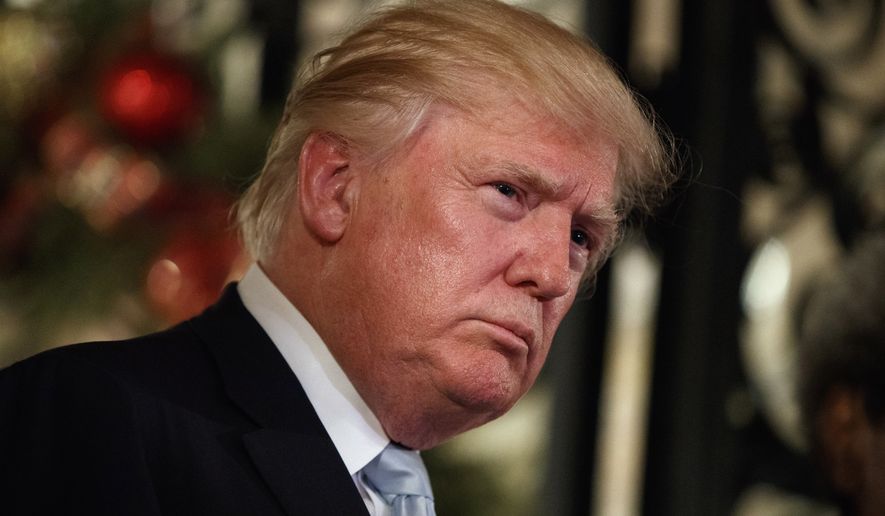The White House has been privately urging the State Department to speed up its protracted process for releasing Hillary Clinton’s still-undisclosed emails.
A person close to the discussions said State may shift gears and speed up its responses to Freedom of Information Act lawsuits.
The pressure from the White House may be working. On Thursday, the State Department released a batch of Clinton-related emails that show how she honored requests from Clinton Foundation and campaign donors to pull some strings. The department turned over to Judicial Watch, a government watchdog group, 1,617 pages of documents, including 97 email exchanges not previously disclosed.
Both candidate and President Trump made a big issue of Mrs. Clinton’s mishandling of classified data in emails stored on her at-home unsecured server and her decision to have 30,000 of those emails erased. She claimed all of the destroyed emails dealt with personal matters, but the FBI was able to retrieve more than 2,000 and said a portion contained classified information.
The irony is, Trump administration attorneys have been in court defending the State Department’s desire for a slow security review process before release, which a district court judge approved.
As recently as June, Mr. Trump tweeted, “Crooked H destroyed phones w/hammer, ’bleached’ emails, & had husband meet w/AG days before she was cleared.”
Tom Fitton, who directs Judicial Watch, a conservative nonprofit, estimates it will take until 2020 for all documents to be released at the current pace.
“The Trump administration is going out of its way, the agencies Justice Department, FBI, DNI and State, to protect Mrs. Clinton,” said Mr. Fitton, who sued the State Department under FOIA. “The State Department is telling us they want to take as long as 2020 to give us the information.”
He wants State to provide two collections: The thousands of unreleased emails the FBI provided to State that were retrieved from Mrs. Clinton’s contacts and were among the 30,000 originals erased by Mrs. Clinton’s legal team.
In addition, the FBI obtained thousands of pages of emails from Clinton confidante Huma Abedin. They were found on a laptop owned by her husband, former congressman Anthony Weiner.
Mr. Fitton said the 2020 calculation does not include the stash from Ms. Abedin via the Weiner laptop.
The bureau investigated Mrs. Clinton’s use of private servers to conduct government business. Then-FBI Director James B. Comey, during the election campaign, said her actions were “extremely careless” but did not violate federal law on the handling of secrets.
Mr. Fitton said Trump administration attorneys have argued in U.S. District Court that a diminished public interest in Clinton emails justifies a slow response. The State Department says it lacks the manpower for the tedious message-by-message process of determining whether any classified information exists and should be withheld.
Mr. Fitton said State was able to work at a faster pace in 2015 and 2016.
“They choose what resources to apply,” he said.
The Obama State Department released over 55,000 pages from 30,490 Clinton emails before the November election on orders from a federal judge. About 2,000 emails were withheld because they contained classified information.
But that was not the end of the story. The FBI investigation recovered several thousand additional emails not released by State. Some were from the batch of erased emails.
The bureau found 49,000 emails on Mr. Weiner’s laptop “which were potentially relevant to the investigation,” said an FBI letter sent to the Senate Judiciary Committee in May. Two emails forwarded to Mr. Weiner contained classified information. Another 10 included classified information and had been placed there as backups. All 12 had previously been viewed by the FBI from other devices.
Mr. Fitton said he is surprised that the Trump administration is in a court brawl with Judicial Watch.
“They are also fighting us on soliciting the Justice Department to go out and find any additional Clinton emails,” Mr. Fitton said. “The Federal Records Act requires the State Department to seek action from the Justice Department when records like this go missing.”
He said the State Department and the Director of National Intelligence are also opposing Judicial Watch’s demand that they perform a damage assessment to determine whether any secrets fell into the wrong hands.
“They say it wasn’t serious enough to warrant a damage assessment,” he said. “That’s what this administration is telling us. They are defending here. It is unbelievable. Really unbelievable. They’ve actually slowed things down during the Trump administration.”
Mr. Fitton said other officials could be implicated in sending secrets on unsecured systems.
“Institutions want to protect themselves from scandal,” he said.
The Washington Times asked the State Department if it will speed up the FOIA screening.
A department official said, “The department takes its records management responsibilities seriously and is working diligently to process FOIA requests and to balance the demands of the many requests we have received. The department continues to process the Hillary Clinton-related emails that are the subject of FOIA litigation and has complied with its court-ordered processing requirements. We cannot comment further as this matter is in ongoing litigation.”
The Times also asked an administration official about White House efforts to have Secretary of State Rex W. Tillerson accelerate release.
“I’ve heard that too. Displeasure at the process was expressed,” the official said. “I don’t know if that is going to do anything. Others have told me there’s just no way to speed it up.
• Rowan Scarborough can be reached at rscarborough@washingtontimes.com.




Please read our comment policy before commenting.